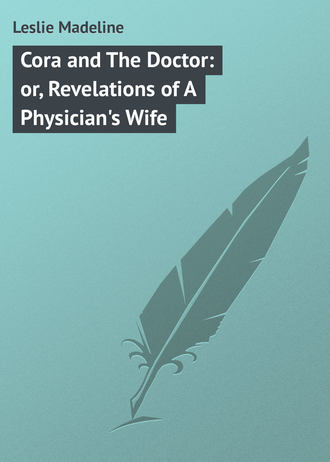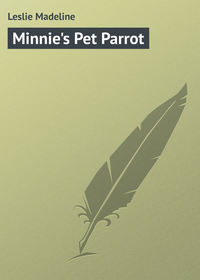
Cora and The Doctor: or, Revelations of A Physician's Wife
The Doctor told her not to interrupt them, and assured her that he would call again. Not long after, Jacob, the porter, came in haste for him to go back, saying that he had been twice to the office in the village to find him.
Frank met him on the road and instantly returned with him. On the way, he was told a lawyer had been sent for who soon went out and returned with two other men. After they all retired, Lucy hastened to the room, fearing the effect of this unusual excitement upon her father. But as he lay perfectly quiet, she supposed him to be sleeping. She sat by his side, when perceiving that he remained for a long time in exactly the same position, she became alarmed and began to chafe his temples and hands. But as he still remained unconscious, she called Allen and sent for the Doctor. When Frank entered the chamber, he found him slightly revived, but unable to speak. He will not probably survive many hours. Lucy is very anxious for the Doctor to remain through the night, and he sent me word that he had consented to do so.
Tuesday, October 24th.My dear husband did not return home until near noon, as he has many patients whom he was obliged to visit after leaving Squire Lee's. He remained by the bed of the dying man the entire night. Poor old man! It was really affecting to see how hard he tried to speak. He is very anxious to make Lucy comprehend something, but she cannot get the least clew to it. The feeble invalid wept that they could not understand him. At length, Frank put a pencil into his hand and held the paper before him; but in vain. He could not hold the pencil, and shook his head in despair.
About eight o'clock this morning, the Doctor was called from the room by Mrs. Burns, who said to him, "Mr. Colby, the lawyer, is below; and when informed that you were in the house, he requested to see you."
Before they entered the parlor, Mrs. Burns in a low but agitated voice, said, "Dr. Lenox, do ask him if Mr. Lee was making his will yesterday. I know, the dear old man meant to do right by Lucy."
As Frank opened the door, Mr. Colby arose, and bowed, saying, "I have been told by the house-keeper that Squire Lee is suffering from another attack of paralysis; and I wish the opinion of his physician whether he is in a sound and disposing mind, and is capable of finishing some business transactions."
The Doctor replied, "he is not."
"I hold in my hand," continued the lawyer, looking over a document, "a deed of gift of a small house and a piece of land. It is in favor of a widow by the name of Churchill, whose prospects have been ruined by her husband while in Squire Lee's employ. The language of the deed is a little singular for a man of his character. It reads as follows: 'Deeply regretting in the sight of God, before whom I am soon to appear, the various wrongs of which I have been guilty toward Otis Churchill and through him toward his family, and in consideration of his long and valuable services the receipt of which I hereby acknowledge, I do give, grant and convey unto his wife, Mrs. Hepsibah Churchill, her heirs and assigns a certain lot of land with the house thereon, it being the same which I took from her husband in execution of a mortgage thereon, situated and bounded thus – .'"
While Frank was rejoiced that his dying patient had felt disposed to do something to restore the widow and orphan to the happiness which had been destroyed by his influence, he could not help sighing as he feared lest a suitable provision for his daughter had been too long postponed, if not wholly neglected. Mr. Colby was exceedingly interested and anxious to ascertain how long it was after he took leave of him on the preceding day, when the old gentleman was seized with this attack. He asked if it were indeed true, as the house-keeper had informed him, that the old gentleman had not spoken since he left.
Learning from the Doctor that the patient was now in a dying condition, he departed, expressing great regret that the state of the invalid should render it impossible for him to transact the legal business contemplated.
Wednesday, October 25th.Emily has just returned from Squire Lee's, where she has been since yesterday. The servants are in dreadful excitement for fear Joseph should be left in possession of all the property, since it cannot be ascertained that a new will has been made. They vehemently declare that they will leave the house when their dear young mistress does. It appears very clear that the father intended to make a new will from what he said to Allen, and also from what Mrs. Burns heard him say to his daughter the morning after the wedding, when she was preparing him to receive the lawyer. Lucy was then smoothing his gray hair, and affectionately kissed his pale cheek, when, holding her hand he said, "you must try to forgive your poor old father for all his cruel treatment of you. You can take pleasure in thinking that by your affectionate care, you have made my last years the happiest of my life." Then after a short pause, during which Lucy could not command her voice to speak, he continued, "I mean to give you this estate and Allen shall – " Here a fit of coughing interrupted him, and he never after renewed the subject.
Emily says, "the dear girl is so affected at the thought of losing her father, that she does not seem to realize that by his death she is to be cut off from everything. Allen, however, is in a prosperous business, and I do not doubt she will be happy."
Mr. Colby called again last evening; but of course no business could be transacted. Allen asked him, if he had transacted business for the Squire heretofore, and thought him slightly embarrassed as he replied that he had done so, but principally through the son. Allen farther asked, if he knew where Joseph was at present, and ascertained that he was on the eve of departure for Europe. Mr. Colby farther stated that a document had formerly been put into his hand which he supposed to be a will.
Thursday, October 26th.Lucy is very anxious to have her brother come home if possible to see her father once more; and Allen wrote a note to Mr. Colby begging him to go to New York and detain Joseph from his voyage until after the funeral.
This morning Squire Lee revived from the dreadful stupor in which he has been lying for nearly twenty-four hours, and was able to swallow a few tea-spoonfuls of wine and water.
He again tried to make them understand something. He pointed with his hand to Lucy, then to the articles of furniture, then back to her. The cold clammy sweat stood in drops upon his forehead from his violent attempts to articulate.
"Dear, dear father," said the weeping girl, unable to bear it longer, "don't try to speak."
He pointed again.
"Do you wish me to understand that I am to have them?"
His countenance brightened at once.
"Thank you, dear father, all will be right."
He fixed his eyes for a long time upon the lovely countenance suspended from the wall, and then closed them.
Lucy asked in a low voice, "can you trust your Saviour? He has promised to save you if you will but trust him."
The dying man slowly opened his eyes, a bright smile passed over his features, and his spirit took its flight. That glorious smile of triumph through the Beloved still lingers. No doubt his eternity will be spent in singing the abounding grace of God.
Friday, October 27th.A dreadful accident happened in the village to-day. Mr. Stone, a respectable mechanic, fell from the top of a house where he was at work upon the chimney. The staging gave way, and he was precipitated to the ground, a distance of over thirty feet. He has no family, and has not long been a resident in the place; nevertheless there is great sympathy manifested at his sudden death. The Doctor reached him about twenty minutes after he fell, but found him dying; and thinks that he knew nothing after he struck the ground. He immediately wrote his parents to ascertain their wishes with regard to the body of their unfortunate son.
How true it is that in the midst of life, we are in death; one moment in time; the next in eternity. The family where Mr. Stone boarded, and where Frank obtained the address of his parents, describe him as a very moral, upright young man who attended church regularly on the Sabbath, and who seldom left the house after he came in from his work in the evening. His landlady was very much affected when the Doctor carried her the intelligence; but said she thought him prepared to die.
CHAPTER XXIV
"This fond attachment to the well known placeWhence first we started into life's long race,Maintains its hold with such unfailing sway,We feel it even in age, and at our dying day." Cowper.Saturday, October 28th.The funeral services of Squire Lee are to take place on Monday afternoon. Joseph has not yet arrived. Allen is not at all sure that he did not immediately leave the country as they heard, for fear his father would refuse to pay the note he had forged under the false signature of agent of the firm. But Lucy feels sure he would not be willing to leave until their father died, and the estate was settled. Poor girl! she has wept until she can weep no longer. She now begins to realize the trial of leaving her dear home, and all the associations connected with her mother and father.
Mr. Mansfield, Allen's father, has expressed his earnest desire to have them leave the house directly after the funeral, and make their home with him. But Lucy will not consent to leave until Joseph arrives, or until she is forced to do so. Emily thinks she secretly hopes that her brother will wish to share the estate with her, when he knows his father's dying wishes. Her husband has no idea of this kind, and says he is only too happy in the possession of such a treasure as his Lucy. He is now in business with his father; and though not able to live in the splendor she did before her father's sickness, yet he can give her every comfort, and he is sure he can make her happy.
Monday, October 30th.I was exceedingly disappointed in not being able to attend the funeral, but I will give you Emily's account of the services. Mother accompanied Frank and sister to the house of mourning. Being the members of the family of the attending physician, they were shown into the room with the relatives. This is the common usage here. The adjoining rooms, hall, and stair way, were filled to overflowing with neighbors and friends. Our pastor commenced the solemn services of the occasion by reading a few select, and very appropriate passages of Scripture. These were followed by remarks, in which he alluded to the change in the character of the deceased, and to his peaceful death. He stated, that during the past year, he had enjoyed many conversations with him upon the subject of personal religion. He had always exhibited at such times, a humble, penitent spirit, and a deep sense of gratitude to a long suffering God, who had not cut him off in the midst of his sins; but had allowed him space for repentance. He then closed with an appropriate and impressive prayer.
When he had concluded, an opportunity was afforded for all who desired to take their last look at the marble countenance of the departed. After this a long procession followed his remains to the place of sepulchral rest.
During all this mournful scene, Joseph, who had arrived an hour before the obsequies, exhibited the most astonishing indifference. Not a tear evinced sorrow at the loss of his only parent; though his affectionate sister was bitterly weeping at his side. He sat a loathsome, bloated form, gazing abstractedly about the room, or yawning as if already weary of this last poor respect to the memory of his deceased father.
In compliance with the request of Allen and Lucy, the Doctor and Emily returned to Lee Hall, to be present at the reading of the will. As Joseph, the executor, had but just arrived, he was not in possession of the document, and sent Jacob to Mr. Colby to procure it. He soon returned, and after Lucy had summoned Mrs. Burns to the room, Joseph proceeded to read it. This legal document, you will remember, was dated on the very day Lucy refused to marry William Arnold, and had no doubt long been keenly regretted by the testator. By this unrighteous instrument, his affectionate daughter was cut off from any portion of her father's estate, which was all bequeathed to his son Joseph Lee, Jr.
This brought so vividly to the remembrance of the weeping daughter the trials which had long been forgotten, or thought of but as a troubled dream, that she could scarcely support herself. Emily besought her to be comforted, reminding her of the words of a favorite poet,
"The darkest day,Live till to-morrow, will have passed away."The Doctor had long determined, if an opportunity presented itself, to tell Joseph what he knew to be the wishes of his father; and to state his conviction that he had intended to provide for his daughter in a later will. This he now did, and appealed to him as a son and brother to perform the oft repeated wish of his father toward his sister. He was proceeding to say that Mrs. Burns, who had been present on some of these occasions, could corroborate this testimony when he was interrupted by Joseph, who had waited with ill-concealed impatience for him to finish.
"It's of no use wasting words in this matter," said he, trying to control his angry feelings, "If she whom you call my sister, had acceded to the wishes of her father, (whom she now pretends to mourn) in the choice of a husband, this will would never have been executed. If she had remained single, I, as the executor, and only heir, should have set it aside, and shared the property equally with her. But as she has chosen her path, so she must walk in it; as she has married a mean rascal," (for the first time letting his eye rest upon Allen, and with the look of a fiend,) "she must take the consequences."
At the first mention of his wife in this insulting manner, Allen had started to his feet; but the Doctor put his hand gently upon his arm, and he sank back into his seat.
Poor Lucy was spared the pain of hearing his insolent mention of her husband; she had fainted in Emily's arms.
All was now confusion. Mrs. Burns was flying for restoratives. Emily and Allen chafing her cold hands, while the servants alarmed at the noise were running in from every direction. Joseph walked deliberately into another room, slamming the door after him. The Doctor proposed taking the unconscious bride to her own apartment. Emily indignantly refused, and said, "I will not leave her in the house another moment." But neither her husband nor her physician would consent to have her leave in that condition. Beside the latter, determined to leave nothing undone, meant secretly to make one more appeal to Joseph in his sister's behalf.
After a few moments, the sufferer drew a long sigh, and becoming conscious, stared wildly about the room, and then burst into a passionate fit of weeping.
The Doctor, who knew this scene ought not to be prolonged, sat down by her side, and gently tried to soothe her. He soon drew from her the fact of her strong desire to carry with her the portraits of her parents.
Emily began to urge her afflicted friend to hasten her departure. In truth she says that she feared every moment a fresh outrage; and Lucy left the room feebly, as if the weight of years had fallen upon her. She wished to go through the house and take a sorrowful leave of the home of her childhood, and more especially of the apartment where she had spent two years in the society and care of her father; now hallowed by the remembrance of his peaceful death. Mrs. Burns supported her on one side, and Emily on the other, while she thus took her sad farewell of places and objects so dear to her heart.
It was not the thought of leaving the gorgeously furnished parlors, where the brilliant-hued carpets gave back no echo of the foot-step – where were mirrors the height of the rooms – chandeliers where the light was caught and reflected from innumerable hanging crystals – crimson velvet lounges and divans whose outstretched arms invited repose; it was not the thought of leaving these which overpowered her. No; it was the nursery of her childhood, – the cradle of her infancy – the closet, in which kneeling by her gentle mother, she had first learned to pray – the private sitting-room where her willing ears first drank in vows of affection from her Allen – the chamber in which both father and mother had breathed out their souls to God. These were the places and objects over which she yearned in agony of spirit as she gazed her long farewell.
Then came her separation from the old servants who had many of them remained for years solely out of affection for her. And who, when her sorrow for herself was changed to care for her stricken father, had shared her duties and attentions to him during the long period of his sickness. She assured them she should never forget their faithfulness or affection. Mrs. Burns, who had long been regarded as a friend and companion, was to accompany her, and for the present to remain in the house of her father-in-law. The rest crowded around her and wept aloud.
In the mean time the Doctor had taken advantage of their absence to venture into the presence of Joseph; when he asked him if it was indeed his intention to drive his only sister from her home.
The unnatural brother coldly replied, "she must leave, and the sooner the better for all concerned."
Frank then begged for her the portraits of her parents.
"No, not an article shall she – " but seeing an awful look of indignation on the Doctor's face he checked himself, and said, "well, I won't object to that; they're no use to me. You may tell her she may take them, – and stay," he added as Frank was leaving the room, "tell her that she may send a servant for all her gewgaws and finery; I shall want them out of the way."
His indignant hearer deigned not a word of reply, but left the room, and told Allen to take the portraits, which with a few articles for immediate use were put into the carriage, and with grateful, though sad adieus to their sympathizing friends they drove away.
Emily would not remain a moment longer. "Get me away! I can't breathe here!" she exclaimed to her brother, as they were waiting for the carriage.
Tuesday, October 31st.Mrs. Burns returned to-day to Lee Hall, and found it indeed desolate. Not a servant remained but the porter; and he had only been detained for a few days, by a promise of great wages. While Mrs. Burns was packing, he came stealthily to her room, and told her what had taken place after she left. Shutting himself in his own apartment to avoid the disagreeable scenes around him, the new owner of this princely mansion hastened out when all was quiet to order brandy and cigars to be brought in with supper. He rang the bell. There was no response. He rang again. He then walked angrily to the kitchen, but all was deserted. He stamped and swore until the maid servants clung together in their affright, and only wished themselves safely out of the house. Each one of them would far sooner have given up the wages due them, than to have ventured into the presence of this monster in human form.
At length he was heard coming up stairs, and Jacob came out of his room dressed to leave; when really pitying his frightened companions, he determined to turn Joseph's anger against himself. After hearing the most abusive language unmoved, Jacob told his master, he would follow him to the parlor, and there receive his directions.
Joseph appeared to remember that he was compromising his dignity by condescending to follow a servant to his room, and he went below.
With a whispered word to his companions to leave their effects with him, and depart, the kind hearted Jacob waited upon his master, though he will not call him such; and there was persuaded to remain a short time as mentioned above.
Mrs. Burns told the good man that she would see that every cent of their wages was paid to them, and then with his assistance loaded the wagon with the trunks, and took her leave of the place where she had passed nearly twenty years.
Saturday, November 18th.We have heard nothing from the proprietor of Lee Hall, except the fact from Jacob, that Mr. Colby has completely domesticated himself in the family; and the new servants brought from the city, have all given notice of their intention to leave. Two of the girls were indignant at their employer on account of his insulting familiarity.
Jacob says the house is seldom quiet until long after midnight; and that alarmed by the uproarious noise in the parlors, he has sometimes ventured below and heard violent altercations between Joseph and the lawyer. But the next morning, when they had slept off the effects of their wine, they appeared as friendly as ever.
Sister Emily went with Allen and Lucy to-day to look at a pretty cottage, with a view to house-keeping. The distance from Allen's business was the only objection, as they do not intend to keep a carriage. The bride has not yet recovered from the effects of the excitement and sorrow through which she has passed. We all think the novelty of furnishing her house will occupy her attention and be of use to her.
Thursday, November 23d.After breakfast this morning Frank showed me the following notice in the Crawford Advertiser.
"Probate Court Notice.""At a court of Probate held in the town of Crawford, county of – , and commonwealth of Massachusetts, November 22d, 1837, whereas there and then appeared Joseph Lee, gentleman, to set up what he claimed to be the last will and testament of one Joseph Lee, deceased, and whereas objections were filed with this court by his brother-in-law, Allen Mansfield, against this instrument from a belief that it was not the last will and testament of the testator, therefore notice is hereby given to all parties and persons interested to appear before me at 10 o'clock, A. M., Thursday, the 30th of this month, and show cause if any there be, why said will should not be set up and executed.
– , Judge of Probate.November 22d."
Monday, November 27th.The Doctor was notified to-day to appear before the Probate Court as a witness for Allen Mansfield against Joseph Lee. His sympathies are of course with Lucy and Allen, and he will testify to what he is sure were the intentions of the father. But he feels quite confident that there is no legal testimony in the case, sufficient to prove that he ever did make a will according to his intentions. It appears extremely improbable that if such a document had been in existence previous to the marriage of his daughter, that he should not have mentioned the fact to Allen. But he only said, "You will not have a portionless bride." That such a document did not then exist is almost certain from the fact it could not have been made without the knowledge of some one in the house, since though the old gentleman was perhaps capable of drawing up a legal document, and had the perfect use of his right hand, yet such document being drawn up, would not be admitted in court without witnesses.
Then if executed the day after the marriage took place as was at first hoped, where is it? What motive could there be for concealing it? and for allowing one of former date to be presented and set up?
Friday, December 1st.Yesterday the Doctor attended the Probate Court. Mr. Willard appeared for Allen Mansfield. After the will had been read, and proved by the witnesses, to be both genuine and authentic, Mr. Willard asked leave to call for the witnesses to the deed of gift to widow Churchill; and endeavored in vain to prove by them that a subsequent will had been made.
One of the witnesses to the latter instrument was not living, being the young man who was so suddenly killed. The other testified that no farther business, except signing the deed was transacted in his presence.
Lawyer Colby corroborated this testimony, while Joseph Lee after being sworn, testified that although Mr. Willard's statements might be true as to his father's intention to make a second will, he had yet to learn that such a will had actually been made.
For want of proof of the existence of a second will, the one then before the court was set up and Joseph Lee duly appointed executor upon his deceased father's estate.
CHAPTER XXV
"How may the mother's heartDwell on her son, and dare to hope again?The Spring's rich promise hath been given in vain,The lovely must depart!Is he not gone, our brightest and our best?Come near! and bear the early-called to rest!"Ye weep, and it is well!For tears befit earth's partings! YesterdaySong was upon the lips of this pale clay,And sunshine seemed to dwellWhere'er he moved – the welcome and the blessed!Now gaze and bear the silent unto rest!" Mrs. Hemans.Friday, March 16th, 1838.My dearly loved mother, – With a heart borne down with sorrow, I take my pen to communicate the sad intelligence which even as I write my heart refuses to believe. My sweet little Walter, my first-born son; your only grandchild, is, alas! no more on earth!









